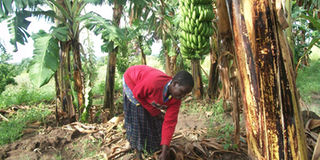Heed warnings on soil fertility

On Wednesday, the ministry of Agriculture rang an alarm bell regarding the fertility of Uganda’s arable land.
What you need to know:
- The issue: Soil fertility.
- Our view: A policy on soil, if passed and implemented, would benefit both the farmers who want high yields, and would ensure that Uganda remains the land that feeds us.
On Wednesday, the ministry of Agriculture rang an alarm bell regarding the fertility of Uganda’s arable land. Findings showed that 21 per cent of Uganda’s arable land is infertile. This means that the soil on this land cannot support plant growth. These are worrying findings for several reasons.
First is the usual narrative about agriculture being the backbone of our economy. While some have debunked this premise, saying income from agriculture is not all it is made out to be, the sector’s importance cannot be overlooked. Which brings us to the other reason for worry; Uganda has always been praised for her rich soils. These soils inspired our national anthem’s third stanza, which says our land feeds us because of its fertility.
Indeed there are several people who put food on the table by growing it – the subsistence farmers. When the soils become too poor to produce crops, this raises a food insecurity problem. Last year, a study by the Food Rights Alliance and other organisations revealed that 10.9 million Ugandans experienced acute food insecurity between March and November. One of the reasons for this insecurity was climate change’s effect on soil fertility.
The ministry’s findings should, therefore, be a clarion call to everyone involved. Farmers should adopt better practices such as fallowing to preserve soil nutrients. Government ministries, departments and agencies responsible for conserving our soils should take up their mandate, especially since this is not the first time this alarm bell is going off.
In 2012, Prof Julius Kitungulu Zake, a soil scientist, warned of a crisis if farming continued without efforts to replenish the soils. He highlighted the decrease in banana yields over the years as one of the effects of poor soil nutrients. Six years later, another warning comes our way. While efforts to conserve the environment, and by extension quality of the soils, have been made, the country needs an intervention addressing soils in particular. There has been talk of a draft national policy on soil for years.
However, nothing substantial has come of it. Such a policy would give clear guidelines on protecting our soils. At the moment, as long as land is available and the owner wants to partake of agriculture’s fortunes, they will grow the latest crop being touted as a moneymaker without taking into consideration the health of the soil.
Where people test the soil, it is usually to establish whether the crops will grow and not necessarily to conserve it. A policy on soil, if passed and implemented, would benefit both the farmers who want high yields, and would ensure that Uganda remains the land that feeds us.


